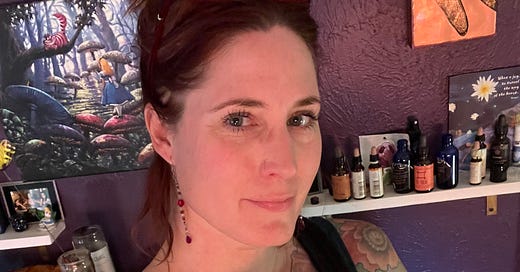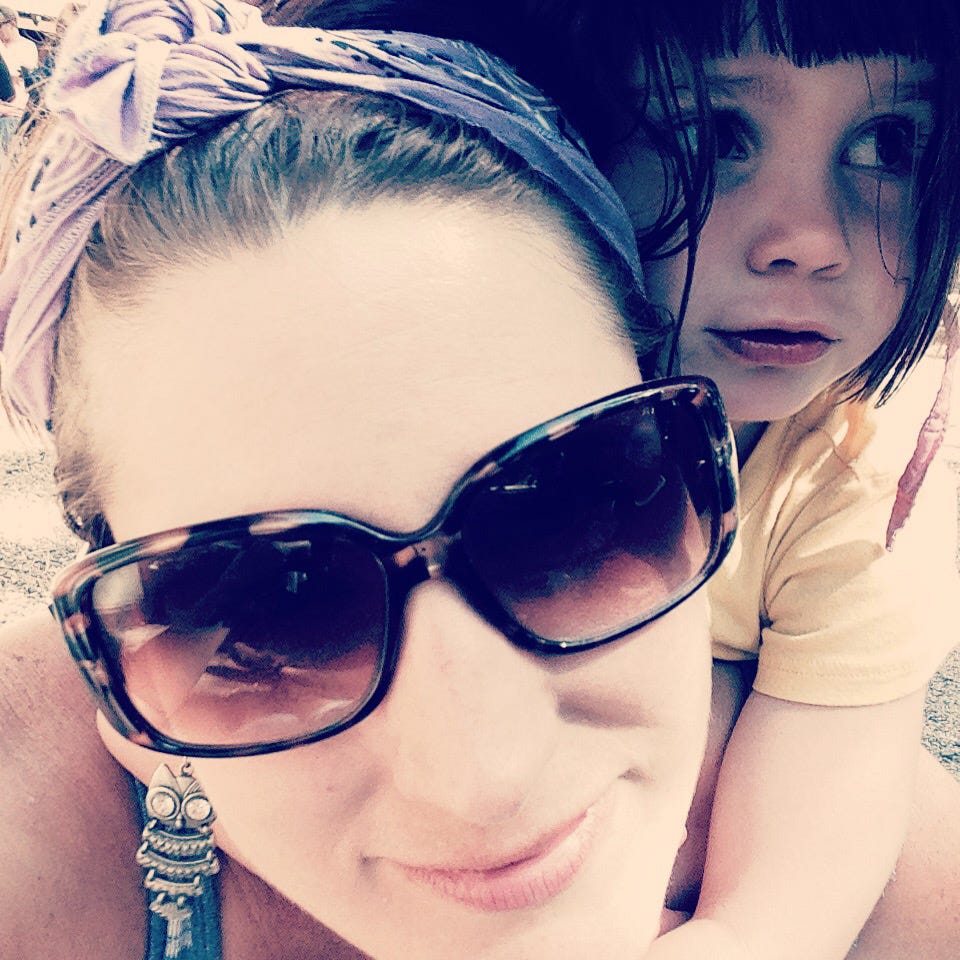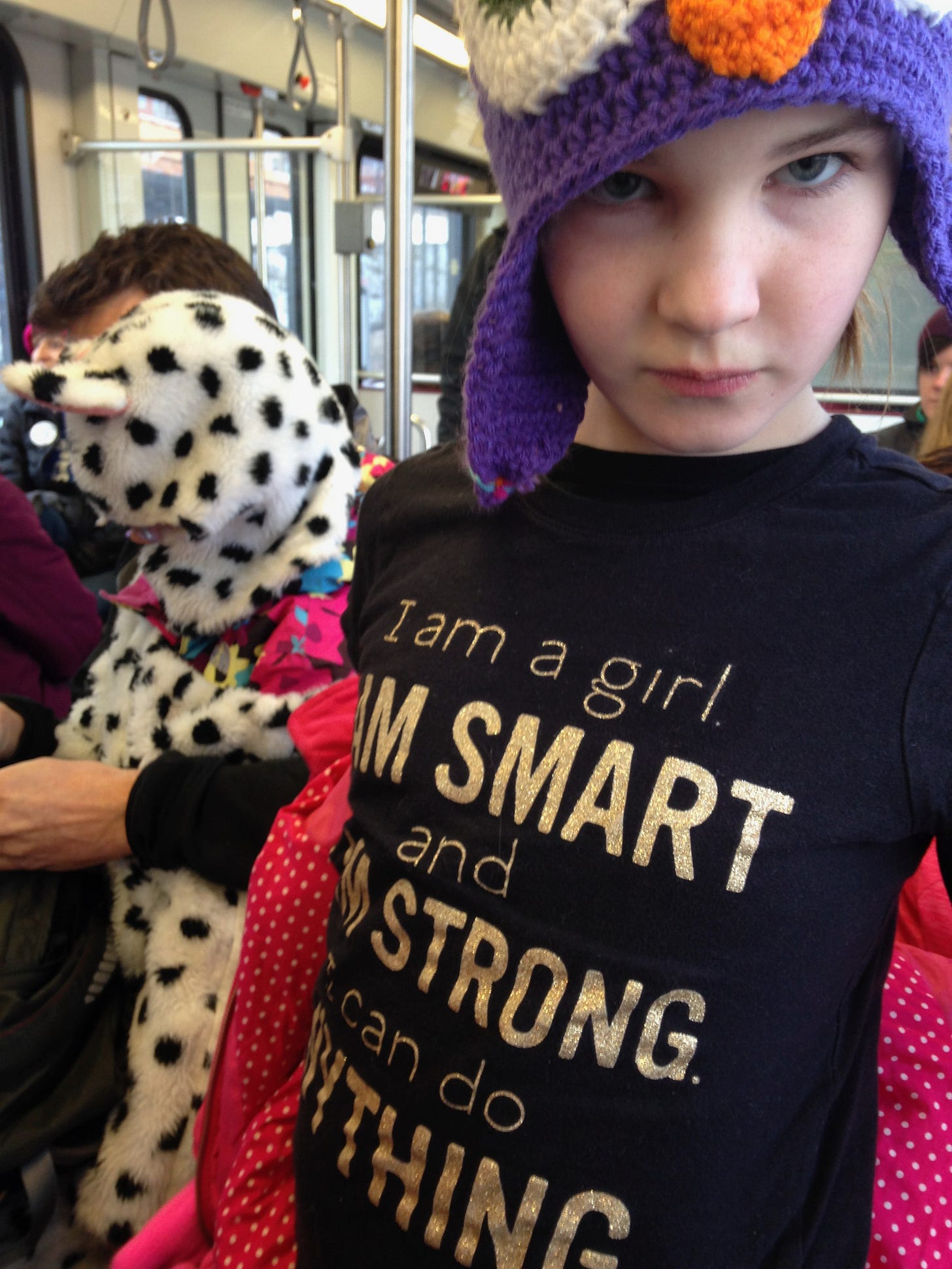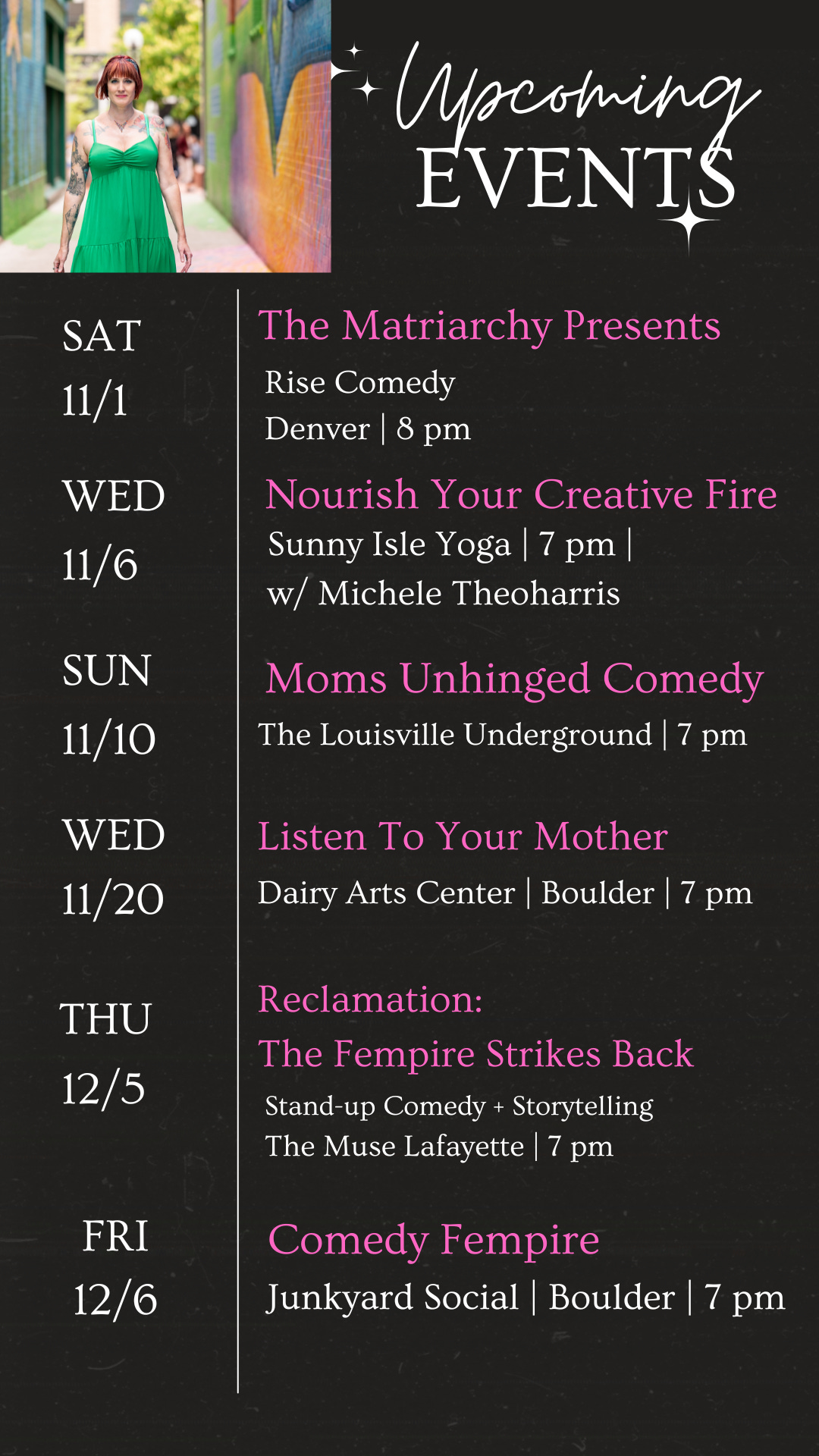Writers, is there a book inside you that is ready to be born? Join a supportive group of midlife women and let’s get your book planned together. Join our four-week workshop, “It’s Time For Your Book,” beginning November 13th.
Colorado local moms: Join me on Wednesday 11/6 from 7-9 for an evening of recharge, release, creativity, and catharsis. Details for Nourish Your Creative Fire here. We’ll have movement, meditation, sound bath, journaling, and connection.
So, tomorrow is a big day. If you are a frequent reader of this column, chances are good that you, like me, are incredibly anxious about what happens next.
While everyone has something at stake, mothers of daughters may be feeling even more uneasy. Uneasy, terrified, full of rage that cannot properly be expressed. . . semantics.
It seems appropriate that in the weeks leading up to this historic and chilling moment in time, I’ve been reading
’s groundbreaking book, Sexism & Sensibility: Raising Empowered, Resilient Girls in the Modern World. I started following Dr. Finkelstein’s work several months before the book was released, and I’d been anticipating it eagerly, not only as the mother of two teenage daughters, but as a voice teacher to adolescent girls, a creative writing instructor for midlife women, and producer of storytelling and comedy shows specifically by and for women.Empowering girls and women—whether in actual adolescence or midlife (a bonus adolescence with the gifts of wisdom and perspective as a consolation prize for perimenopause)—is kind of my jam.
In fact if I could sum up all the disparate aspects of my work in one tidy elevator pitch it would be this: Creating a safe, empowering container to help build, amplify, and curate the voices of girls and women.
It’s Time To Talk About It
Dr. Finkelstein explains why it is so important that books like this exist and why we need to explore these topics, bringing them finally into the light: “By the time girls are forming a sense of self in the world, they can tell the playing field isn’t level, but that’s rarely made explicit for them.”
There is simply no way for me to encapsulate the tremendous resource this book is—you need to buy it and take copious notes. But, I’m me, so here is my attempt to rein in my verbosity and zoom in on one of my favorite aspects of Sexism & Sensibility.
I devoured this book (carefully, with a highlighter, obviously), and while it is absolutely jam-packed with insight, social science, statistics, practical ideas, and sobering commentary on everything from body image, sex positivity, social media, rape culture, capitalism, porn, ambition, and gender stereotypes, it was the chapter on “finding her voice” that spoke to me the most. Because as a mother (and teacher, producer, and performer), voice is what I spend the most time emphasizing to my own children and all the girls and women I work with.
Of course, I appreciated the tips on how to actually teach this to girls—complete with a nod to the mic-drop Kamala Harris strategy: “I am speaking”—but I couldn’t tear my eyes away from the commentary of how we got to this place. I had to stop highlighting individual sentences and just started drawing a yellow line next to entire paragraphs.
Speaking of mic drops, one of the chapter’s sections is titled, “The Invisible Work of Girlhood: Performative Femininity.” Doesn’t that say so much, all on its own? Dr. Finkelstein references the invisible labor and mental load many adult women are all too familiar with, but then highlights the not-so-subtle programming girls receive very early on that lets us know we are responsible for managing everyone’s feelings. Essentially every woman in my creative writing groups has struggled to shake off this heavy yoke, and we all write about it with a nearly rabid sense of purging.
Dr. Finkelstein describes experiences so many of us can relate to: hiding the most genuine parts of ourselves out of necessity, being labeled overly sensitive and dramatic, and being talked out of our intuition.
Her description of what this feels like as a teenage girl made my throat ache with recognition:
“My own teen years were full of tiny missteps and long hours puzzling over the most artful way of declining requests or delicately sharing an accomplishment. From a young age, girls are expected to accommodate others and ensure they don’t hurt others’ feelings. And while empathy and cooperation are important for all children to learn, girls are pushed into unproductive ruminations that are distracting and anxiety provoking and that sap them of valuable mental and emotional energy.”
Can I get a “fuck, yes?” (Those are my words, not hers.)
Writing Our Way Out
Every week when I read and workshop pieces of memoir and personal essay written by midlife women in my groups, we marvel at the similarities in themes. So many women are writing about marriages, divorces, and family of origin dynamics where they unconsciously carried burdens they never, ever wanted, leading up to the moment when they finally shrugged them off, Atlas style.
I find myself reading hungrily, desperate for the writer to lead me to the end of the path when they finally woke up and had their own Network-coded, “I’m mad as hell, and I’m not going to take it anymore!” moment and simply stopped. Stopped caretaking grown men, stopped silencing their own voices for the sake of preserving the status quo or protecting fragile male egos, and stopped allowing the gaslighting that told them this was acceptable.
Show us the way, I implore. We know you got out, but show us how. When did you stop doing this? How do we all learn it, and how do we teach it? Let’s return to our anthropological origins of basket emptying and meadow reports—those who have walked this path, please report back and teach us how we too can reclaim our voices and power and safety. Let’s tell the others; let’s teach the girls.
Because discussing ambivalence in motherhood was the origin of my return to writing, this passage resonated deeply: “Mothers are bound by the same norms that restrict their daughters. No matter your age, where you grew up, your race or ethnicity, if you’re female, the caregiver archetype—with the expectation that you’re unerringly good and self-sacrificing—is projected onto you.”
During the times in my life I have dared swim against this powerful current, I have been branded “selfish” or “too much.” And I know I’m not alone in that.
With the election looming, Dr. Finkelstein posted a fantastic piece on her Substack,
, called Beyond Abortion: When Even Progressive Men Don’t Understand the Stakes. She wrote:As I argue in Sexism & Sensibility: Raising Empowered Resilient Girls in the Modern World, acts of benevolent sexism like picking up the tab at a restaurant or giving up your seat on the bus can seem perfectly courteous on the surface, but it perpetuates a sexual narrative where a man’s in control and a woman adopts a passive role.
The insidiousness of this control/passivity dynamic is chilling, and difficult to shake off. For most of us, it has followed us around for decades, and we spend midlife trying to process it, understand how we got here, how we were accidentally brainwashed, grasp how we begin to wake up from it. This is why I want to write about it, talk about it, teach it. This is why I want to stand on stage and share what it feels like to be a woman in this world, why I want to continue to produce shows where women’s voices are finally heard.
It’s why I wrote a memoir about the process of clawing my way to a midlife diagnosis of neurodivergence when my “nice girl” upbringing kept me firmly locked in place for decades, ignoring my intuition and perfecting my practice of not rocking boats and remaining quiet and good. (No, you can’t read it yet; the first draft is done, the book proposal is complete, and now I am in the soul-crushing “wait” phase of the “hurry up and wait” lifecycle of writing memoir. I digress. Here’s an excerpt.)
Another subsection of Sexism & Sensibility’s chapter on finding voice is called “Creating Space for Strong Voices,” and it made me want to rebrand my entire website with that message. Yes. If there is one thing I could do with this wild and precious life of mine, it would be to create safe spaces for strong female voices (or at least non-hetero-cis white males; yes, I love those guys, too, but remember, Grandma Myrtle taught us that we can’t be on all the committees, didn’t she?).
Every one of my voice students—from ages 9 to 15—gets a weekly earful from me about more than just healthy vocal technique. They hear me talk about confidence and taking up space, about honoring and allowing for their talent, sharing it without apology. We talk about taking the lid off our voices. We discuss that while we have been trained to keep our bodies small and quiet, instead, we practice noticeably filling our bellies with air—moving them as we sing—making ourselves big, our voices expansive.
My own daughters have heard an earful from me for the entirety of their lives. They roll their eyes at mansplaining and shameless displays of toxic masculinity. They watch movies from the 90s with me and ask, aghast, “Did he just kiss her without consent?” My 13-year-old even took umbrage with It’s The Great Pumpkin, Charlie Brown last week, wryly remarking, “The moral of the story is, girls shouldn’t go out of their way for a man.” #RestitutionForSally
Those of us raising daughters are filled with terror right now. But I believe we are also filled with awe, and hope. I may have gotten quite a bit wrong along my motherhood path. God knows I swear too much and my house is untidy and I frequently, unapologetically lied on reading logs. But I have unwaveringly taught my girls about their own worth, the strength of their own voices, the power of their own desires and needs. I have taught them that they do not owe anyone shit when their personal safety and integrity is on the line. Yes, we are thoughtful, respectful, and kind. But we do not give ourselves away.
My girls know to channel their inner Future Madam President (yes, I’m knocking on wood, goddammit, while also employing my positive thinking/ manifesting/ visualizing/ potent agnostic prayer) and say: Actually, I. AM. SPEAKING.
XOXO,
Steph
Are you a parent of a girl? Aunt, teacher, friend? You simply must buy this book. Order Sexism and Sensibility here.
Here’s what’s coming up this month: Grab tickets here.
Writers, is there a book inside you that is ready to be born? Join a supportive group of midlife women and let’s get your book planned together. Join our four-week workshop, “It’s Time For Your Book,” beginning November 13th.
Did you catch my column last week? I did something I’ve never done. I changed the title after the fact. Instead of “What We Should Be Teaching Kids About Marriage and Divorce,” I changed it to “What We Could Be. . .” Hope, am I right?










Oh (wo)man, thanks for this! I’m feeling a LOT of things about this election and so are my LGBTQ kids. I will def read that book and follow her Substack. I was trying to explain to my boyfriend how scared and heavy this election is as a woman (even a privileged whites woman, I know others have it worse) and also how LONELY it feels bc I truly don’t know if any man can really get it. I’ll never forget the line in Handmaids Tale, the well meaning and seemingly good husband of Offred, in before times, seems to the protagonist to almost *like* the role of protector as women’s rights begin to quickly erode. That chilled me to the bone. Do all men secretly want a world where their power is more? Or simply, wouldn’t mind it? I hope not. But sometimes I wonder. Here’s to all hope surviving tomorrow. And if not, let the fighting back for our rights begin. Again.
I am standing by your side wondering all these same things. Do they secretly want that? Even the “good ones”? I think some do. Deep breaths for the week ahead.